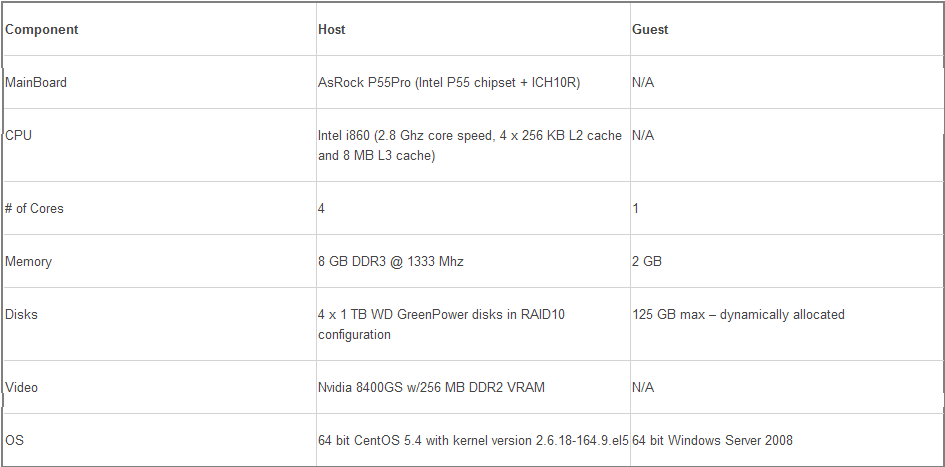

- Xen vs kvm vs virtualbox vs vmware drivers#
- Xen vs kvm vs virtualbox vs vmware Pc#
- Xen vs kvm vs virtualbox vs vmware free#
- Xen vs kvm vs virtualbox vs vmware windows#
It costs as much as a cheap PC and its limitations are only really as much as your physical hardware. I've used Workstation since v1.0 back in 99 and it's just what I'm used to.Īs for cost, it depends on what you classify as "expensive". I personally prefer Workstation to server, but I think server would fit most people's needs. "Workstation is best but its too expensive so that is not an option." Since virtualization in the x86 world hasn't been around for twenty years, your experience is likely mainframe related, no? I am a veteran in virtualisation industry and have spent 20 years in it, so I know for sure that they are way way behind the reality."Ĭare to elaborate? I'm interested in hearing what you have to say on the subject because well, I don't believe you. Looks like Canonical is no longer maintains the 'commercial' repository for Gusty onward. This all said, I'll probably go VMware next time I need one, basically for the same reason Brian stated, experience is worth much more.Īs for VMWare not being in the Ubuntu repository anymore. So check out your apps before choosing a VM.
Xen vs kvm vs virtualbox vs vmware drivers#
Also I've heard that in some cases, apps don't run as fast in a VM then in a native system, I know on Macs you run into issues sometimes with graphical apps needing to run in OpenGL modes since proper graphic drivers aren't available (may no longer be the case any more, not sure). I know that newer systems are supposed to be designed to handle VMs, but I still wouldn't expect a perfect solution. I personally prefer the remote desktop/display idea, but that is not always available. My main issue with virtual machines is that anytime you are running a second machine you are splitting your resources between two systems.
Xen vs kvm vs virtualbox vs vmware free#
This all said, I stuck with VirtualBox primarily since it is free and it worked.
Xen vs kvm vs virtualbox vs vmware windows#
I also found that at this time most of the apps that I wanted on windows are working with Wine, so I stopped running VMs altogether. then again my machine is not the most expensive system, it is a 3 year of 64-bit AMD (running as 32-bit) system with only 1GB of RAM. Well I've used VMware, Parallels and VirtualBox on my Ubuntu machine.

I'd probably try VirtualBox first if I were you because it's very low-investment to try it out. The tradeoff is that you can't just run anything as a guest.Īs for the rest, I've used VMware Workstation and Server for ages and I've always been happy with it, but I also tried VirtualBox recently and was very pleased especially given the price. That means that the "host" (the virtualization layer) can rely on the "guest" knowing certain things, and the "guest" can take advantage of things that are useful for virtualization but which don't appear in a regular standalone PC. Instead, it pretends to be a very specific kind of PC-ish hardware which the "guest" operating system has to be written to run on. Xen squeezes more performance out of the virtualization layer by throwing away the idea that it has to appear to be a generic PC. Basically consider Xen to be a way to virtualize Linux servers on a Linux server yes, there's more possibilities than that, but just think of it that way for now. And boy would I publish the shit out of those documents.Xen is not like the other things. I don't know if I'll get the opportunity to test on like hardware any time soon, but I'd really like to. Given the much higher specced hardware on VMWare's side (both the connections to the storage, and the storage itself) I would have expected VMWare to blitz the test. Results were all over the place (some wins to VMWare, some to KVM).

VMWare was running VMFS over 4Gbit/s FC to a HP EVA SAN with 15KRPM FC disks (again, 3GHz Xeon on the host), and RHEL5 KVM was running block-level iSCSI to another RHEL5 box with internal 7200RPM SATA storage (iSCSI LUNs carved up per LV) over 1Gbit/s copper Ethernet (again, 1.6GHz Xeon). Unfortunately my Bonnie++ tests were not "apples to apples". They were totally shocked when they saw the differences.įor shits and giggles we also benchmarked HP-UX's Integrity Virtual Machine platform (VSOE), and it peaked at 2.5Gbit/s on a 1.6GHz Itanium2 box. Strangely enough none of them had ever done the same tests, and confirmed it on their own kit back in their lab. We had VMWare gold partners and networking experts totally stunned with that. VMWare managed a pitiful 800Mbit/s on a 3.0GHz Nahalem Xeon host (not even Gbit speed, despite being almost twice the clockspeed under the hood!). RHEL5's KVM managed 2.6Gbit/s between two VMs on a single 1.8GHz Nahalem Xeon host. Click to expand.I've done both of those internally now.


 0 kommentar(er)
0 kommentar(er)
